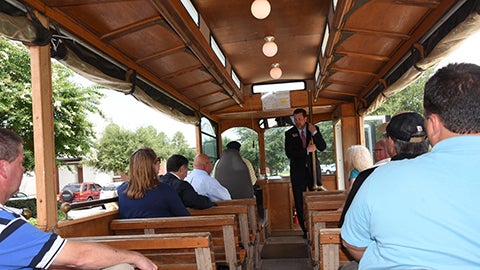SGTC hosts Diesel Equipment Technology Strategic Industries forum
Published 8:00 pm Wednesday, October 26, 2016

- SGTC President John Watford, Ed.D. is shown on the Americus trolley conducting a tour of the SGTC campus and diesel labs.
AMERICUS — “The average salary for a Caterpillar diesel technician is currently $77,000 per year,” said Jim Larson, Corporate Training manager for Yancey Brothers Co. when he addressed approximately 125 individuals who attended a special Diesel Equipment Technology Strategic Industries Forum hosted at South Georgia Technical College (SGTC) in Americus. “That is the average. here are some lower and some higher. And there are over 100 job opportunities at Yancey Brothers here in Georgia and that number may double over the next few years,” added Larson.
The Diesel Technology Forum was sponsored by the Technical College System of Georgia, which is spotlighting different high demand industries that are covered by the Governor’s Strategic Industries Workforce Development Grants (SIWDG) to entice individuals to enroll and train for careers where there are job openings. Those areas include diesel equipment technology, commercial truck driving, early childhood care and education, electronics technology, industrial systems technology, machine tool technology, medical coding, networking specialist, nurse aide, phlebotomy technician, practical nursing, and welding and joining technology. Hope grant eligible students receive extra funding for these specific programs.
Technical colleges in Georgia are hosting these forums each month and spotlighting different high demand industries. SGTC was selected to host the Diesel Technology forum because of its strong partnerships with Caterpillar, John Deere and other top diesel industry representatives.
Technical College System of Georgia (TCSG) Deputy Commissioner Matt Arthur was one of the featured guests at the Diesel Equipment Technology Strategic Industries Forum and he thanked SGTC President John Watford, Ed.D., for hosting the event.
“We are hosting these type of events all over the state but this is by far the most populated forum that I have attended. I appreciate each of you being here today and spreading the good news about the careers that are available and how to obtain the skills to work in these industries,” said Arthur.
Jim Larson, for Yancey Brothers Co., Caterpillar; Matt Griner, Regional Sales manager for Flint Power Systems, John Deere; and Brad Lafevers, president/CEO Heart of Georgia Railroad, Southeastern Regional Rail Car Repair, and Cordele Intermodal Services were the featured speakers and panelists. Joe Dan Baker, executive director of Academic Affairs for the Technical College System of Georgia was the facilitator.
Matt Griner from Flint Power Systems, said that his industry also has a very competitive compensation package for diesel technicians and that John Deere is faced with the same problem of finding enough good trained technicians.“Diesel Technicians of today have to be multi-talented. They don’t just have tool boxes and gloves. They also have to have computer and diagnostic skills. This is becoming a very specialized program and it pays good money,” said Griner.
Both Griner and Larson said that the future is bright for this industry.
“The southeastern United States is one of the strongest areas for this industry,” said Larson. “Georgia is the shining star and leading the way. We need diesel technicians because without diesel power generation every individual’s life would be affected. Diesel engines are responsible for moving every product that we enjoy at home and at work. That includes, food, furniture, clothes, building materials, almost everything. Think about it.”
Larson also said that with today’s technology the air that comes out of a diesel engine is now cleaner than the air that goes into the engine in many cases.
Lafevers also talked about how his businesses are all tied to transportation and logistics and diesel engines.
“The opportunities are tremendous for the students here today who have selected this as their career path,” said Lafevers, “but there is room for many more individuals to capitalize on this industry.”
He also encouraged individuals to pay attention to what is happening in the world.
“Businesses are here to make a profit. Businesses offer you the opportunity to go to work. You don’t have a right to that job, but your education and performance can help you earn that privilege. Understand that your education is only as good as the package that carries it around. You are that package. Your character, work ethics, desire to learn, personal discipline – that is what makes you different and desirable to a business owner.”
All three individuals agreed that diesel technology is not just a job but a career that can lead an individual anywhere.
“This industry is evolving,” said Griner. “We need technicians who keep up with technology and are willing to continue their education. Just because you start out as a technician does not mean that you cannot grow and progress in this industry.”
Lafevers followed up on that statement by adding that as parents and grandparents, “we all want our children to be successful, happy and thriving. This is a core industry to help them achieve those goals and there is a good chance that these jobs will not be exported to China.”
Lafevers also encouraged the students to show initiative and strive to take advantage of opportunities to move up in the organization. That idea was followed up with these thoughts by Larson. “Basic diesel is the cornerstone of a great career,” explained Larson. “You can go anywhere from here.”
All three individuals encouraged students interested in this industry to sign up for one of these programs at SGTC or another technical college.
“You can get an education for almost free if you maintain your grades, so why wouldn’t you want to do this?” asked Larson.
“The Technical College System of Georgia is superb. I would like to thank you for what you do,” said Lafevers, who also served on the board of directors at SGTC. “Diesel technicians are in high demand, welders are in high demand. These are not easy fields, but with the right skills and mindset, it is a long term opportunity.”
All three panelists also stressed safety.
“Safety is huge,” said Lafevers. “Safety is a daily, by the minute job. You can’t take it lightly.”
Larson added that the machines that his diesel technicians work on each day cost more than most people’s houses.
“Safety is a major concern and we work hard to insure that our employees and the equipment that they work on is kept safe. Remember, your education or skills may get you a job but poor character or poor personal discipline is probably what will cost you that job.”
Larson also pointed out that every business in the diesel industry is faced with a “retirement bubble..”
“We stay awake at night thinking about how to find qualified people with the right behavior package to hire,” explained Larson. “We do have a large number of technicians approaching the retirement age and we need to replace those workers. You are a part of that model for our industry over the next three, five, and 10 years.”
Griner also added, “It is a major uphill battle to replace experience and talent. You can hire talent, but you can’t replace experience overnight. It is a concern.”
When asked how they go about looking for diesel technicians, Larson replied. “There are two ways to get into this business with Caterpillar – build them or buy them. Right now we rely heavily on building them. We work with technical colleges like South Georgia Technical College all across the nation to get students enrolled in a good technical program to acquire the skills needed to be successful in this industry. Or we work with apprentice programs to train individuals. The other way is to buy them and get individuals who are already well established in the industry with the right skills and behaviors that we are looking for.”
“John Deere does the same sort of things,” said Griner. “We have a program here at South Georgia Technical College to train our technicians. We also rely on word of mouth from our valuable employees. And the key word there is the valuable or good employees who know what it takes to become a good technician.”
The bottom line said Larson, Griner, and Lafevers is that “we need you. We need trained diesel technicians. Our local economy, our state, and our nation rely on diesel engines running and running efficiently.”
Following the panel discussion individuals were encouraged to tour the SGTC campus as well as tour the new diesel technology building expansion, the Caterpillar and John Deer diesel labs.





